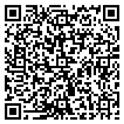

P.4 What does it mean to be a woman/girl in rural Nepal?
P.6 Living with menstrual isolation
P8. Kindred Sisters





P.4 What does it mean to be a woman/girl in rural Nepal?
P.6 Living with menstrual isolation
P8. Kindred Sisters



First and foremost, I want to express my heartfelt appreciation for your unwavering support to vulnerable people through Asian Aid. Your generosity and commitment are the driving force behind all our work.
As many of you, our faithful supporters will know, Asian Aid has always sought out additional ways to improve the lives of women and girls, along with the main outcomes of child support and community development. Our women and children’s health programs have been addressing the critical issues of menstrual isolation and pelvic organ prolapse in Nepal, as well as ensuring the overall wellbeing of children in our care. These issues have profound implications for the health, dignity, and wellbeing of women and girls: our KindRed Sisters.
How are we helping our KindRed Sisters?
Thanks to your generosity, we have been able to implement a range of initiatives aimed at raising awareness, providing education, and delivering vital healthcare services.
Through workshops, training sessions, and community outreach efforts, we are working to empower women and girls with knowledge about menstrual hygiene, dispel myths and stigma surrounding menstruation, and promote access to essential menstrual hygiene products.
We are also working to address the issue of pelvic organ prolapse, a serious medical condition that affects many women in Nepal. Through partnerships with local healthcare providers and organisations, we are expanding access to screening, diagnosis, and treatment services for women suffering from pelvic organ prolapse, helping to alleviate their pain and improve their quality of life.
None of this would be possible without your support. Your generosity enables us to make a tangible difference in the lives of women and girls who are facing some pressing health challenges.
As we continue our KindRed Sisters campaign to promote women and children’s health in Nepal, and in communities in India and Bangladesh with similar issues, I invite you to join us in this important work. Your continued support towards our KindRed Sisters will be crucial in helping us reach more women and children, deliver more services, and create lasting change in communities across the region.
Together, we can make a meaningful impact on the lives of our KindRed Sisters in Nepal and beyond.
Blessings, Paul

MORE THAN 1 MILLION WOMEN IN NEPAL SUFFER FROM PELVIC ORGAN PROLAPSE, WHICH IS APPROXIMATELY 10% OF NEPALI WOMEN.
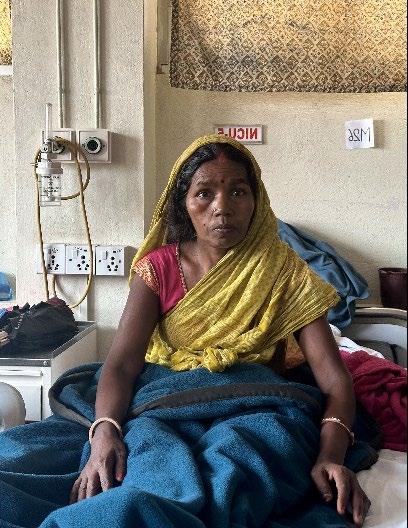
This
is Rupa*. She was married when she was only 12 years old. She had seven children but only four have survived. Rupa suffered from uterine prolapse for 15 years.
When she heard about a free women's health camp in her village, she eventually decided to visit the camp. Rupa was diagnosed with third degree prolapse. Our partner team were able to bring her to the Scheer Memorial Hospital for surgery. Rupa is now able to go about her day without any suffering, happy and with a new lease on life.
We are working relentlessly to ensure mobile healthcare services reach remote areas, breaking geographical barriers. By providing education, raising awareness, and offering medical assistance, together we can empower women like Rupa and eliminate this silent suffering. *name changed
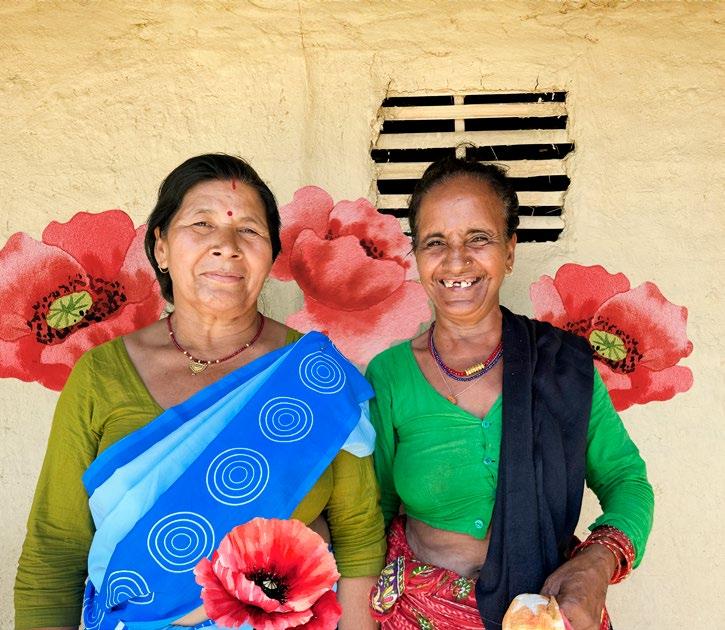
Mrs Bimala, a community health volunteer, is passionate about her work and makes sure she takes advantage of Asian Aid’s camps to provide maximum benefit to the ladies of her village.
She approached the Asian Aid team regarding one such lady in her village who had been suffering terribly from pelvic organ prolapse, but unfortunately, she was not able to bring her to the camp. The lady was a single woman with no children and would not travel with her to the camp site as there was no one to look after her goat which was her only child, friend, and family.
Hesitant yet determined, Mrs Bimala approached our partner team and made a request which she did not expect to be fulfilled. “Sir, can we travel to this lady’s house and bring her here? She needs help but she won’t come. I tried several times.” The team travel long distances for ladies like her. The camp is especially targeted for ladies who cannot approach healthcare facilities due to various obstacles. Mrs Bimala sprang into the vehicle with
the team that drove about one hour through the dirt road, fields and rivers. The lady was taken by surprise when she saw a vehicle approaching her house. Mrs Bimala grabbed her arm, “It won’t take too long, come with me, we will find a solution to your discomfort and suffering. You may never get a second chance to be seen by a doctor.” The lady tied her goat in the shed and joined the team for a journey in a vehicle that would have taken her almost half-a-day’s walk otherwise. Another lady from the same village also travelled with them to the camp site.
The doctor found both ladies had significant prolapse, which was reduced and managed by pessary rings. The ladies returned home a little more physically comfortable, as well as being reassured that they would be taken care of in the future, if the need arises.

Less than 60% of births in Nepal are attended by a trained professional.
This happens for a number of reasons:
• Many families live too remotely to receive help from medical professionals when delivering babies.
• Distrust of modern medicine or faith in traditional methods, which are often unsafe and provided by someone without training.
• A lack of education that proper care is even required.
Having a home birth can be dangerous for both mother and baby. Some children delivered at home will not be registered properly, excluding them from state recognition and benefits.
Your tax-deductible donation can keep women and their babies safe during childbirth and provide trained professionals in remote communities.
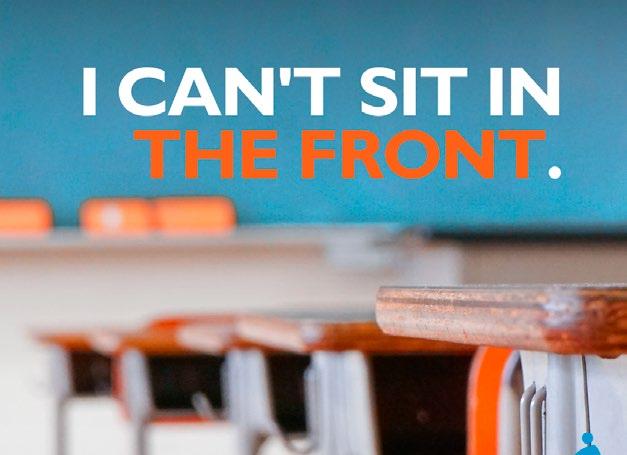
Many communities we serve in Nepal are so remote that there are no nearby medical centres, and women with uterine prolapse walk for days to reach one of our rural health camps. That is why it is so important that we continue to send teams out into these rural communities to help women and families who would never have received the help they need otherwise. You can help women living in remote communities access the medical help they desperately need.

According to a UNICEF study, 45% of girls in Nepal felt uncomfortable sitting toward the front of the classroom when they had their periods.
Discomfort, pain and fear of leakage meant that half of the girls said it was hard to concentrate during class. Girls in rural communities are often unable to obtain proper sanitary supplies due to economic concerns or availability.
You can help ensure that sanitary supplies are a given, not a gift, and end period poverty for many.
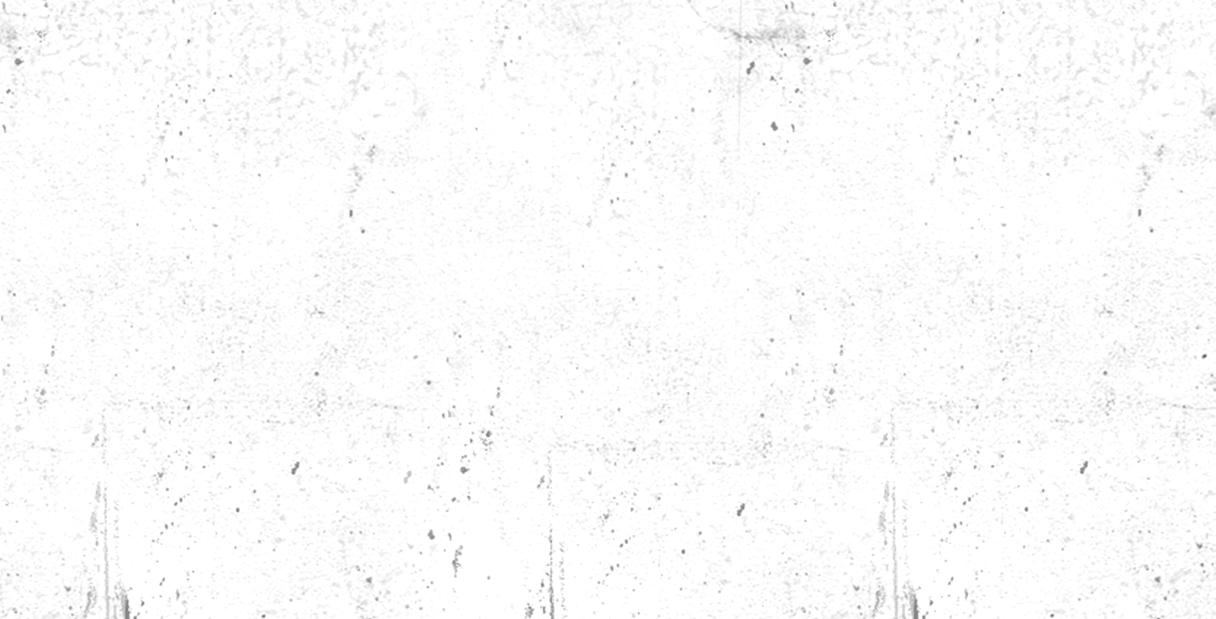
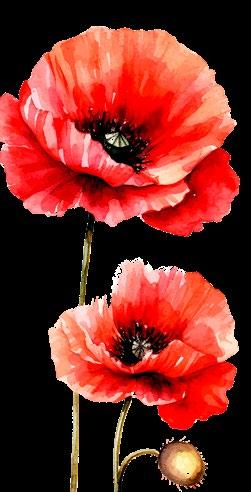

In Bangladesh, sanitation latrines and handwashing stations are improving the health and hygiene of children.
Water systems in our village schools in Bangladesh are ensuring children can have safe, clean drinking water.
Following eye check ups, many children were given glasses and are better able to learn.
Nutritious, protein-rich meals are giving children in partner schools in India the energy they need to learn.
In extremely rural areas in India, blankets, mattresses and mosquito nets are protecting children's health.
Children from our slum communities in India are participating in morning sports sessions which equip them with positive health practices, leadership and problem-solving
skills, and with tools to connect with their community. This has helped them reduce emotional stress and enhance their social and academic skills.
Girl-friendly toilets (with clean water and sanitary disposal facilities) in Nepal are enabling girls to attend school throughout the academic year, including during menstruation.

Manisha is only 13 years old, studying in Grade 8. The day she got her first period, when she was 12, was the day she felt fear, shame and panic like never before. It worsened when her elder sister told her that she had to leave home and stay at the menstrual hut outside their house.

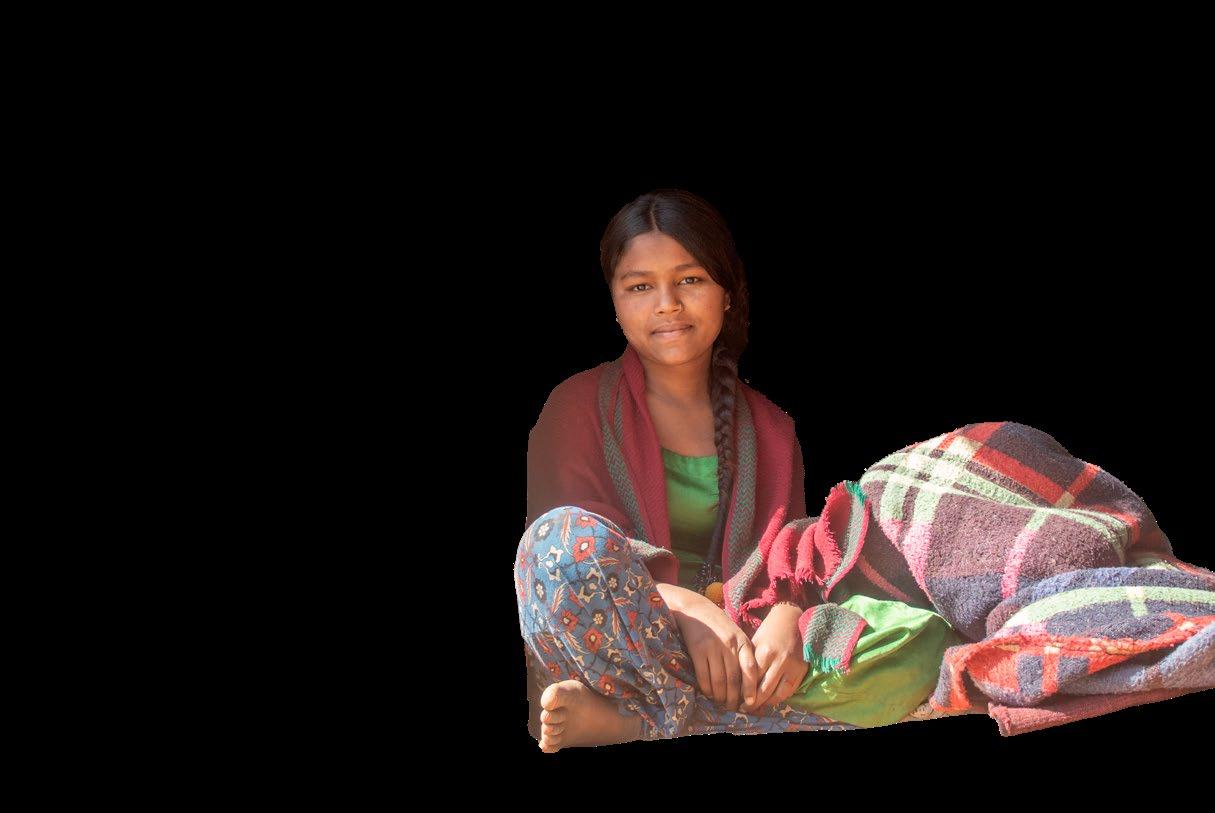
She was confused and scared – her mind constantly thinking about how she would sleep alone at night in the hut, how she would concentrate on school without proper sleep for seven days and how to overcome her fears of intruders at night. Even so, she had to stay and sleep in the shed.
Manisha, and many girls and women in her village, live an even more difficult life during menstruation. Manisha cannot eat and drink when she feels hungry and thirsty. She has to wait for someone to bring her food and water. There are restrictions that she should not enter the house, should not sit and sleep in the same bed she used before or will use after menstruation, should not enter the kitchen and use utensils, should not touch drinking water inside the kitchen, should not eat milk or curd, should not touch male members of the family, should not touch cattle, should not touch fruit bearing plants,
and so on. Since she is not allowed to use tap water, stone spouts (channelised water supply used commonly in Nepal), or the neighbourhood well, she has to bathe in the muddy water of a distant irrigation canal.
In summer, I have to suffer from wind and rain and the fear of snake bites, and in winter, my body shivers with cold, skin goes numb and it is hard to sleep.
“In summer, I have to suffer from wind and rain and the fear of snake bites, and in winter, my body shivers with cold, skin goes numb and it is hard to sleep,” says Manisha.
“Sometimes there is no one to feed me at home so I have to miss school when I have my period and am hungry, because I have to walk 35 minutes to school."
Manisha worries about being blamed for bringing bad fortune if she does not strictly follow these menstrual restrictions. She thinks it is better to stay in the menstrual hut even though it is painful than bring bad
luck and misfortune to her family. But, she also is of the opinion that the Chhaupadi custom should be changed or eliminated.
Despite the Nepal government’s initiative of banning the practice of Chhaupadi in 2005, followed by the “Chhaupadi Pratha” Elimination Directive in 2008, the menstrual isolation practice still exists in many villages. Along with our in-country partner, we have been working to change mindsets and help families overcome their fear of stopping the practice. Access of adolescents to adolescent sexual reproduction health services is also very important for the overall wellbeing and empowerment of adolescent girls like Manisha. Through this service, they receive information, counselling, and medical support tailored to their needs.

We have been putting up more updates, pictures and sharing what our team have been up to. Our social media is growing and we want you to be part of it. We also have some exciting content we are launching soon so come follow along!

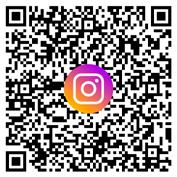

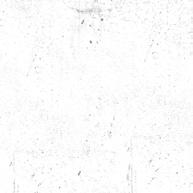
The 2024 Annual General Meeting (AGM) of Asian Aid Organisation Ltd ACN 002286 419 (Asian Aid) will take place on Sunday, 4 August 2024 at 10 AM. You are invited to join us, either in person or via livestream. Location details will be shared soon.
Thank you for your ongoing sponsorship and financial support, and for the impact this has on the lives of many disadvantaged children and their communities.
As you may be aware, many banks are stopping administering cheque books and accepting them as deposits. If you have been paying your donations using cheques in the past, we need to let you know that the following options are available for continuing to make donations and/or pay your child sponsorship with Asian Aid.
You can make a direct deposit into our bank account, use a credit card over the phone or online, or pay via BPay. If you need an ID, you can call us on 02 6586 4250 or email us at contact@asianaid.org.au.
Thank you for partnering with us and for making life better for someone else.
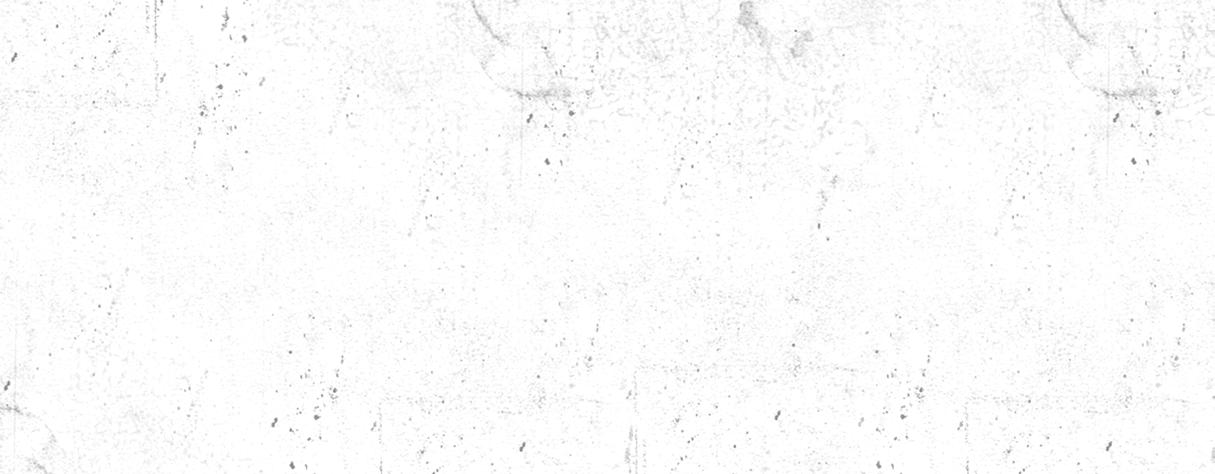
$7 Hygiene kit for a child

$20 Pessary ring for treatment of a uterine prolapse patient
$30 Pair of prescription glasses for a child in a rural school
$60 First aid kit for a rural school
$240 School-based awareness session on adolescent health, menstrual isolation, and prevention of uterine prolapse and cervical cancer
$500 Uterine prolapse surgery for a woman
$650 Medicine for a women's health clinic
$1,500 Treatment for cervical cancer or breast cancer patient
$5,700 School toilet block for girls with water and sanitary pad disposal facilities
$34,000 Portable echocardiography machine to identify heart conditions in children/women in rural settings
